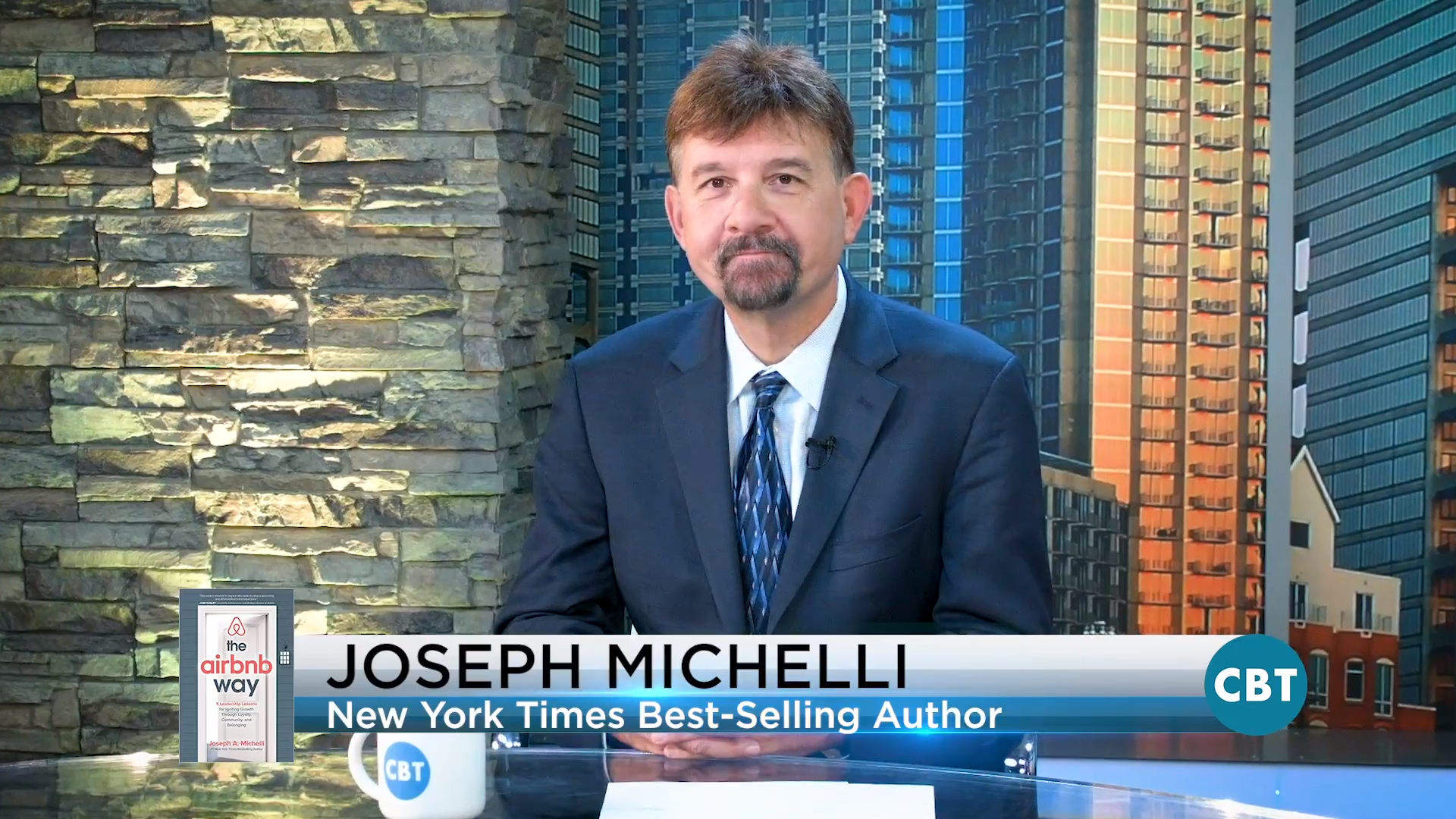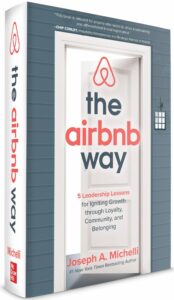On today’s show, we’re pleased to welcome back Joseph Michelli, New York Times best-selling author and customer experience expert. Joseph also has a new book out titled “The Airbnb Way: 5 Leadership Lessons for Igniting Growth through Loyalty, Community, and Belonging”. In this segment, Jim and Joseph take a deep dive into these five lessons and discuss other important customer experience topics for today’s auto retail industry.
Jim Fitzpatrick: Hi, everyone. Jim Fitzpatrick with CBT News. Thanks so much for joining me today. Today, I’m very excited to have in our studio Mr. Joseph Michelli. You’ve probably known him from CBT News before. We’ve done a number of interviews with him on a Skype basis and remotely, but so glad to have you in the studio.
Joseph Michelli: It’s great to be in the studio. Thanks, Jim.
Jim Fitzpatrick: Good, good. I know the pilgrimage here to Atlanta, you’ve had a couple of other speaking gigs here, so thanks for weaving us in there.
Joseph Michelli: Oh, you’re a priority. I wanted to make sure I got here. So, thanks.
Jim Fitzpatrick: Well, thank you. Thank you. As many of our viewers know, you’re a New York Times bestselling author and a customer experience expert, and written a number of books, one of them including the Mercedes Benz Experience that’s out there. But your latest book is The Airbnb Way, which is an incredible company that has been a huge disruptor out there in the hospitality business, right? There’s many companies out there that want to know how has Airbnb risen to the top and become the giant that it is, right?
Joseph Michelli: Yep.
Jim Fitzpatrick: You had the opportunity to be up close and personal with these guys and then find out what is the way. You know? You’ve got here five leadership lessons for igniting growth through loyalty, community, and belonging. Talk to us a little bit about that.
Joseph Michelli: Well, if you think about it, in 2008, I was writing books about the Ritz-Carlton Hotel Company, which was the shining star in hospitality, and they were struggling with whether or not they could serve a bottle of beer as a bottle, not in a glass.
Jim Fitzpatrick: Right, without getting fired.
Joseph Michelli: Exactly. Is that relevant to the changing consumer? Here we are, 11 years later, while I was doing that, there were a couple of guys in San Francisco just trying to make rent on an apartment. They listed that apartment on a rudimentary website and-
Jim Fitzpatrick: Is that how it got started?
Joseph Michelli: That’s it.
Jim Fitzpatrick: Wow.
Joseph Michelli: They were serving uncooked Pop-Tarts as the breakfast in the Airbnb, if you will. From there, they’ve moved in those 10 years to a valuation of about $38 billion.
Jim Fitzpatrick: Unbelievable.
Joseph Michelli: The Marriott Company, which is parent to the Ritz-Carlton, is about $42 billion with a lot more physical asset.
Jim Fitzpatrick: Oh my gosh.
Joseph Michelli: Something has happened. There’s a 21st century world out there of sharing economies and a different way in which people are expecting hospitality today.
Jim Fitzpatrick: Yeah, that’s for sure. Talk to us about the five leadership lessons and some of the takeaways from the book.
Joseph Michelli: Well, you know, I think trust, obviously, in the automotive industry is kind of at the core of everything. I also think that the use of technology to engage consumers and so many people really wanting to self-serve themselves into a relationship-
Jim Fitzpatrick: Absolutely.
Joseph Michelli: …but then expecting people who build on trust, who really don’t over claim the things that their products can deliver. A lot of that messaging is in the book, about how they intentionally decrease puffery and over articulation of claims, the importance of reputation systems and how to use reputation systems to advance your business and to do the right thing.
Jim Fitzpatrick: Yeah, that’s phenomenal. This company is… They’re also going places, right? They don’t just stop with renting out rooms or homes. They’ve got a multitude of other facets to their business now.
Joseph Michelli: Yeah. I think not a lot of people are as sophisticated in that awareness, Jim. They started in that clear property access point, but now a lot of what they do is they would give you access to experiences. A lot of seniors are hosting, sharing their knowledge of whatever their passions are.
Jim Fitzpatrick: Wow.
Joseph Michelli: People are signing up for those experiences.
Jim Fitzpatrick: Isn’t that great?
Joseph Michelli: It is.
Jim Fitzpatrick: As it relates to the auto industry, because as you know, the auto industry is too also going through kind of this whole newfound a way to sell cars. We see companies like Vroom out there and Carvana, where somebody can just pick up their phone and hit an app and say, “Yep, that’s the car that I want. Here’s my credit information. Send it to my door,” and up comes a flatbed. More along the lines of kind of an Amazon shopping experience-
Joseph Michelli: Right.
Jim Fitzpatrick: …right, that consumers are adhering to. They sold 180,000 vehicles last year doing it that way. Talk to us about what you find as kind of a commonality among these companies such as Ritz-Carlton and Mercedes Benz and Airbnb that’s connecting with consumers on that level? What do consumers want?
Joseph Michelli: You know, I think at some fundamental level they just want good service. They just want to be able to get things quickly, the right information, a sense of urgency in the delivery, convenience about it all. But on top of that, when they do take the time and have all those conveniences and they interact with a person, they want that person to do something I think of as enlightened hospitality, which is really understand me, appreciate me, give me a greater sense of you are customizing what you’re doing to me as a human. It’s this blend of lots of easy technology, convenience driving technology. Human beings, when they are opted into, deliver something remarkably different.
Jim Fitzpatrick: Right. How do companies train to that now because we do live in this digital world? For the dealers and people that are listening that live in that retail automotive space, everything becomes very homogenized in the digital world where somebody goes onto a website, sees the car, gets the stock number, has their vehicle appraised online, does the financing online. It’s become kind of a sterile or more sterile environment when they come into the showroom where it’s like, “Hey, I already got the car. You don’t have to build a relationship with me as much. I just want to get in I want to get out. I want to be on my way with my new or used vehicle that I purchased.”
Joseph Michelli: Well, and I think if you leave it at that and you accept that that’s what people truly want, then you probably aren’t going to build a relationship with them, and you’re not going to build loyalty, and you’re not going to get that cycle that you need to go from that loyalty in your service department and your service department back to the next sale. For me, I think it really is those moments where you do have the opportunity. It doesn’t have to be a big drawn out process of relationship building, but I think all of the technology in the world today has yet to be able to look you in the eye and say, “Thank you. I’m glad you’re here. I’m appreciative of your business,” and that heartfelt authentic culture of gratitude.
Joseph Michelli: I think the other thing that we talk a lot about in the Airbnb book is belonging. That arrival experience that is excited to see you, authentically excited to see you. Websites have yet to be able to do that.
Jim Fitzpatrick: That’s right. What’s kind of the commonality among these companies that you see from your perspective? You’ve been up close and personal with a number of these big companies both on a luxury side as well as… I don’t know if Airbnb would be considered a luxury provider,” right?
Joseph Michelli: No,. I just think it’s a full range marketplace for housing options and experience options.
Jim Fitzpatrick: What is it that you think that they’re connecting with to the consumer?
Joseph Michelli: I think ultimately there is this sort of ubiquitous opportunity to buy any number of things, a big marketplace, more than a dealership’s inventory would necessarily necessitate. It’s that sense of many, many options. It’s also making it easy to search through those options so I can find the things most related to me. Then I think it’s a culture inside of those businesses that say the technology is an enabler, but this is a human powered experience. That’s true in automotive too. The technology enables the sale, enables the search, enables the service appointment scheduling, all of that. But the real driver for success in these businesses is you have people who really care about and for the person that they’re serving.
Jim Fitzpatrick: Right. Right. That’s key, isn’t it?
Joseph Michelli: It is.
Jim Fitzpatrick: It really is.
Joseph Michelli: Ultimately for all of us. We’re all in the people business.
Jim Fitzpatrick: We want that. You’re obviously a customer experience expert and travel around basically the world talking to companies large and small about how to provide a better customer experience, direct correlation between a great customer experience and the bottom line of that company, right?
Joseph Michelli: Yes, absolutely.
Jim Fitzpatrick: I would assume you’ve leased and purchased cars in your life?
Joseph Michelli: I have. Many.
Jim Fitzpatrick: Where do you think we’re falling short as an expert?
Joseph Michelli: I think for me it feels like the sale is the most important thing. If I go on a website and I give a lead to a car dealer, it seems like the lead is everything. If the lead doesn’t pan out, I don’t have a lot of relationship connection to that at all. Frankly, sometimes they’re still the same old practices. We recently bought a car. There was somebody coming in just minutes later to buy that car. That same person was following me from dealership to dealership, right? I think those techniques are starting to erode trust. Deal with me. To the opposite side of that, I think a lot more transparency in pricing has happened and that has actually been a good thing from a consumer perspective.
Jim Fitzpatrick: Right, right. We just had this discussion with an auto dealer the other day on the show, and that was that we’re sending out some mixed signals to the staff and dealerships because we’re like, “Well, we want to be completely transparent. We want to be all about the customer’s needs, and we want to things at their pace, whether they buy a car today, five days from now or five years from now. The concern is that when they buy a car, the experience is right. They buy it from us, they feel good about it.”
Joseph Michelli: Right.
Jim Fitzpatrick: That looks really good in a mission statement on the wall. Okay? I don’t know how it happens, but from the desk manager to the sales person, it’s, “No, no, no, no, you’re going to do all that, but don’t let that customer leave without buying a car today.”
Joseph Michelli: Right. My incentive is based on whether or not I get that customer to buy that car today. The sales techniques, try to overcome the objections and the delays and create a sense of urgency to buy now. I think they are in conflict. Figuring out how do you align your sales goals because you have to sell and you have to stay in business with the customer experience in a way that that person walks out not feeling overly pressured or there was some kind of trick or tactic used that didn’t hold their person in high regard. In the end of the day, I think brands, if they take more of an internal focus than an external focus on that customer, they pay for it in the long run.
Jim Fitzpatrick: Yeah, they do. They do. I would agree that for… It’s almost like in the auto industry we don’t trust the customer that much. We say we do. We say, “Oh, no. Give him all the information and be transparent. Give him the highest trade in allowance while they’re here and the lowest sale price and the lowest interest rate and a monthly payment, and then let them make an informed decision. Maybe ask them if they’d like to buy today but if they say, no, we’re not ready, hey, no problem, folks. We’re going to send you down the road.”
Jim Fitzpatrick: At the end of the day, sometimes that last push that says, “Send the manager in. Let’s make sure this customer doesn’t leave. Let’s kind of ring out every ounce of buying motives in them to see if we can close it today,” you’ve almost destroyed that opportunity for the customer to come back to your dealership now.
Joseph Michelli: Yeah, I think it’s so well encapsulated. I think if there’s any other pieces to that, it’s maybe we not only trust our customer, we don’t trust our competition, we don’t trust that it’s anything more than a commoditized buy. I guess for me, I really know that price is everything, but not. I mean, it’s a lot of the thing. But the way you engender trust, the way you say, “Hey, you know, I really want you to be satisfied,” and mean it, and then follow up with me the next day and don’t just drop me when I became a less warm lead for you. Those are things that make a big difference to consumers today. We know it. It’s happening in Airbnb and it’s happening in car dealerships as well.
Jim Fitzpatrick: Well, Joseph Michelli, I want to thank you so much for doing this on CBT News. This has been very enlightening. I know the dealers are going to get a lot out of it. They always do when you’re on. Thanks so much for being here in the studio with us.
Joseph Michelli: Thank you very much, Jim. Not that your dealers need to get a free trip to San Francisco, but if they’re inclined, they just go to airbnbway.com. No purchase necessary. They can enroll in a trip and learn more about the book.
Jim Fitzpatrick: That’s awesome. For those dealers that are out there, pick up the book The Airbnb Way. We have a lot to learn from companies like Airbnb and Joseph Michelli has kind of put it all in a nice way for us to understand what they’re doing and what makes them successful. Check out the book. Again, thank you so much for doing this.
Joseph Michelli: Thank you, Jim.
Jim Fitzpatrick: It’s great.
CBT Automotive Network, the number one most-watched network in retail automotive. This has been a JBF Business Media production.









